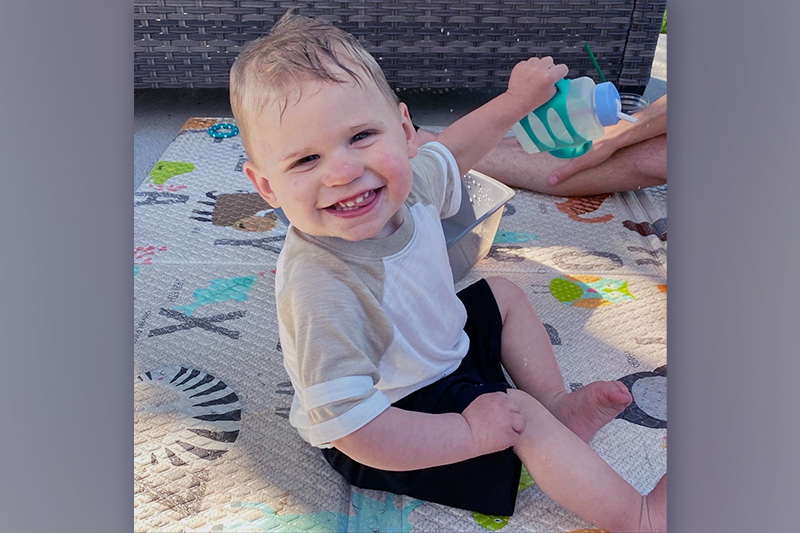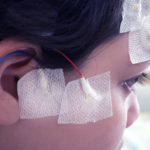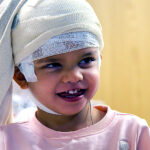How genetic testing helped Wilson help other infants with epilepsy

In August 2021, after months of anticipating their son’s arrival, Emily and Nick felt as ready as they’d ever be to become parents. Happy and excited to finally have Wilson in their arms, they brought him home a few days after delivery. Just over 24 hours later, though, they found themselves back in a hospital and at the start of a search for answers that eventually led to Boston Children’s.
A change in care brings a sense of relief
“It seemed like he was holding his breath,” Emily says of Wilson’s concerning behavior that first brought them to their local emergency room south of Boston. The breath-holding was determined to be seizures, and Wilson was transferred to a nearby pediatric hospital for more specialized care. Despite various interventions and medications, his seizures persisted, so Emily and Nick were given the option of transferring Wilson to Boston Children’s, specifically the Epilepsy Center. They took the offer.
Once Wilson was settled at Boston Children’s, the team went to work to find out what was causing his seizures and how to stop them. Emily and Nick think back on those first weeks after Wilson was admitted as a blur but will never forget the outpouring of support they received.
“At Boston Children’s, we just felt like everyone had such wonderful control over Wilson’s situation and everyone was welcoming and caring.”
“The clinicians talked to us about what they were talking to each other about,” adds Nick. “So, we felt included and informed, which was very comforting.”
Answers for Wilson might bring answers for others
The Gene-STEPS study looks at the impact of rapid genome sequencing (rGS) on infants with new-onset epilepsy, with the goal of demonstrating its diagnostic potential and influence on treatment.
As part of their search for answers, Wilson’s team determined that genetic testing posed the best chance of finding out what was causing Wilson’s seizures. As fate would have it, Wilson came to Boston Children’s just in time to take part in a study investigating how genetic testing could create a potential paradigm shift in how infantile epilepsy is diagnosed and managed.
The Gene-STEPS study, a first-of-its-kind, international investigation co-led by Dr. Ann Poduri, director of the Neurogenetics and Epilepsy Genetics programs, and colleagues at three other pediatric hospitals, looks at the impact of rapid genome sequencing (rGS) on infants with new-onset epilepsy, with the goal of demonstrating its diagnostic potential and influence on treatment. Unlike more targeted genetic testing often used to confirm a specific suspected diagnosis, rGS looks for any changes in a person’s DNA that may explain a medical condition. In the Gene-STEPS study, rGS included both biological parents in addition to the patient. Dr. Alissa D’Gama, a clinical fellow in the Neonatal Intensive Care Unit and research fellow in Dr. Poduri’s lab, is a key member of the Gene-STEPS study team and enrolled Wilson, Emily, and Nick, as its very first participants.
“When they asked us if we wanted Wilson to be part of the study, we thought of it as just piggybacking on what they needed to do to help him,” Nick says.
“We knew it was a research study, we knew all they needed was blood work, and we knew it could potentially be helpful for other families,” Emily adds.
Guided by informed care
The rGS revealed a rare variant in the DEPDC5 gene, which caused a structural brain abnormality called polymicrogyria, characterized by numerous small and irregular folds on the brain’s surface that can lead to developmental and neurological challenges, including the seizures Wilson was experiencing.
“We sat down with the team, and they helped us understand what this [DEPDC5] variant looks like and gave us a much narrower view of expected outcomes,” Nick says.
One treatment option presented was a hemispherectomy, a surgery where doctors remove or disconnect the affected part of the brain to help treat severe seizures after medicine and other treatments haven’t worked. Emily and Nick say their care team, including neurosurgeon Scellig Stone, MD, as well as neurogenetics physicians and genetic counselors, was thorough, understanding, and patient as they weighed their decision.
“Dr. Stone sat with us almost two hours to go over every single detail of the surgery,” says Emily.
Armed with the information and support they had from their care team, loved ones, and other patient families they had met within the Epilepsy Center, Emily and Nick decided to pursue the hemispherectomy. Wilson had his surgery in December 2021 and has been seizure-free since. Today, Wilson is — as Emily puts it — the “happiest kid that you’ve ever met” and loves telling jokes, playing, and meeting new people.
Knowledge-fueled future
A genetic diagnosis can often mean not only a change in a child’s medication and treatment but also guidance for family members who may share the same genetic variant. That’s exactly what happened for Wilson, Emily, and Nick.
The rGS showed that Emily was an asymptomatic carrier of the DEPDC5 variant, meaning Wilson’s variant was passed on from her and that she could potentially pass it on to future children.
Perhaps surprisingly, Emily and Nick say having this information has, in a way, made them feel a bit empowered in how they approach their family’s future.
“It’s given us some peace of mind,” Emily says. “We feel really lucky that we were part of the research project.”
Learn more about the Gene-STEPS study, part of the International Precision Child Health Partnernship (IPCHiP), and how to obtain a second opinion at the Epilepsy Genetics Program.
Related Posts :
-

Homecoming: Jack’s complex care brings a family back to Massachusetts
Georgia and her husband, Keith, moved to North Carolina from Massachusetts in 2015 with a dream of building a house and ...
-

Rapid DNA sequencing yields timely answers for infant epilepsy
Treating children with epilepsy has traditionally been a matter of trial and error, trying different drugs one after the other. ...
-

A path forward for genetic testing in unexplained epilepsy
The number of genes implicated in epilepsy has grown rapidly in the past decade. This raises questions about what tests ...
-

A family’s search for answers and hope for PACS1 syndrome
Alya, 9, was about three weeks old when her mother, Taruna, noticed movements and behaviors she was concerned might be ...





